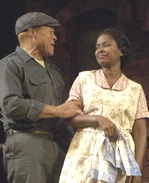SITE GUIDE
SEARCH
REVIEWS
REVIEW ARCHIVES
ADVERTISING AT CURTAINUP
FEATURES
NEWS
Etcetera and
Short Term Listings
LISTINGS
Broadway
Off-Broadway
NYC Restaurants
BOOKS and CDs
OTHER PLACES
Berkshires
London
California
New Jersey
DC
Connecticut
Philadelphia
Elsewhere
QUOTES
TKTS
PLAYWRIGHTS' ALBUMS
LETTERS TO EDITOR
FILM
LINKS
MISCELLANEOUS
Free Updates
Masthead
A CurtainUp Review
Fences
|
If they got a white fellow sitting on the bench. . .you can bet your last dollar he can't play! The colored guy got to be twice as good before he get on the team. That's why I don't want you to get all tied up in them sports. Man on the team and what it get him? They got colored on the team and don't use them. Same as not having them. All them teams the same.—Troy
|

John Beasley (Troy Maxson) and Crystal Fox (Rose Maxson) in the Huntington Theatre Company's production of Fences.
(Photo: Eric Antoniou) |
In this 1950s leg of the cycle, John Beasley, a Wilson veteran, plays principal yapper Troy, and few plays by any playwright depend as much on a single character as Fences does on this ex-con ex-baseball player turned garbage collector. Lucky for us, then, that Beasley speaks Wilson's words so well and so melodically. Troy's tall tales tie him to his sharecropper roots even as they lend him a powerful charisma that almost forgives all his sins.
Almost one of the lessons that Fences hammers home again and again is that we're doomed to repeat the past even though we don't always know it, and that the repetition of past sins is both a blessing and a curse, what defines us and what threatens to destroy us. Wilson loads nearly all the psychological interest in his play in the contradictions, righteous rage, and unforgiveable betrayals of Troy.
To be sure, the relationship between Troy and his wife Rose (the beautiful and long-suffering Crystal Fox) is charming and believable in its turns from affection to exhaustion. And sparks fly when Troy prohibits his son Cory (Warner Miller) from playing football, partly out of envy since Troy never made it to the major leagues in baseball, perhaps because of his advanced age, perhaps because of racism— and partly out of love.
Bellowing, corrosive, loveable, paradoxical Troy, onstage for nearly all two and a half hours, is one of the great roles in American drama. But for all the fire of Beasley's performance, this production is not as moving as it could be.
The storied Kenny Leon, who became Wilson's final collaborator and worked wonders with Phylicia Rashad in Gem of the Ocean, simply doesn't do a lot with some powerful material:. The blocking is static and repetitive, a great many moments of primal conflict, especially in the second act when Rose learns about Troy's affair with another woman, fizzle when they should ignite. Marjorie Bradley Kellogg's realistic set and Ann Wrighton's lighting are likewise respectful, proper, okay, just not particularly exciting. This is picture postcard poverty, not the arduously chiseled home of people living through sustained hardship with dignity.
Leon is good with the music of the language and the play sings most when not a lot is going on; notably, when Troy, his buddy Bono (Eugene Lee, who seems like he could be everyone's best friend), and Rose are shooting the breeze in the backyard. There's still work to be done to give the secondary characters flesh, though, and to establish the rhythm of scenes that can turn from nostalgia to threats of murder in an instant.
Wilson writes in a sort of playful realism—strange things can happen, like the appearance of ghosts or the opening of the gates of heaven, without distorting our sense that his world is continuous with ours. We need to be playful with him too while recognizing that he models the life we know. It's probably inevitable that many productions of his work so soon after his death are going to be too respectful and so will not respect him enough, like commemorative stamps of legendary figures. There are moments of greatness in the Huntington production, but not enough spiritedness, not enough risk, and that finally means not enough Wilson.
For more about August Wilson and links to other Wilson plays reviewed at curtainup.com, see out Wilson Backgrounder.
|
Fences Written by August Wilson Director: Kenny Leon Cast: John Beasley (Troy Maxson), Eugene Lee (Bono), Crystal Fox (Rose), Brandon J. Dirden (Lyons), Bill Nunn (Gabriel), Warner Miller (Cory), Raynell (Faith Lambert and Hyacinth Tauriac at select performances) Scenic Design: Marjorie Bradley Kellogg Costume Design: Mariann Verheyen Lighting Design: Ann Wrightson Sound Design: Ben Emerson Music Direction and Original Music: Dwight D. Andrews B. U. Theatre, 264 Huntington Avenue (617-266-0800), www.huntingtontheatre.org Tickets: $20-82.50 From 9/11/09-10/11/09 Tues.-Thurs. at 7:30pm, Fri.-Sat. at 8pm; select Sun. at 7pm Matinees: select Wed., Sat., Sun. at 2pm Review based on September 16th performance |
|
Subscribe to our FREE email updates with a note from editor Elyse Sommer about additions to the website -- with main page hot links to the latest features posted at our numerous locations. To subscribe,
E-mail: esommer@curtainup.comesommer@curtainup.com
put SUBSCRIBE CURTAINUP EMAIL UPDATE in the subject line and your full name and email address in the body of the message -- if you can spare a minute, tell us how you came to CurtainUp and from what part of the country. |
|
REVIEW FEEDBACK Highlight one of the responses below and click "copy" or"CTRL+C"
Paste the highlighted text into the subject line (CTRL+ V): Feel free to add detailed comments in the body of the email. . .also the names and emails of any friends to whom you'd like us to forward a copy of this review. |






